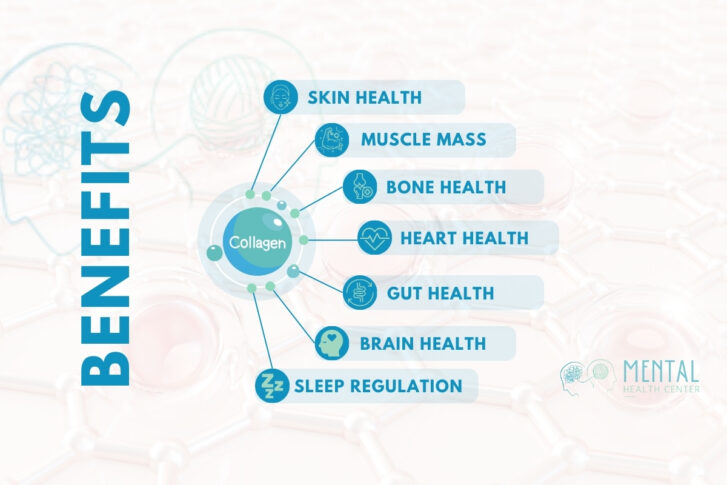Hi there, it’s Jennifer Foster. Today, I’m thrilled to be sharing some of my insights about collagen, a powerhouse protein that’s often overlooked, with you!
While many of you might be familiar with its role in enhancing skin beauty, there’s a whole world of health benefits that collagen offers, which often go unnoticed.
In my extensive research and experience, I’ve discovered some truly fascinating aspects of collagen that can transform the way we think about this incredible protein.
- It serves as a crucial protein for maintaining the structure and health of skin, bones, and muscles
- Adequate levels are important for physical appearance
- Supplementation may support various aspects of health
Let me show you the rest of the benefits.
1. Skin Health
As a focused exploration of collagen’s impact on skin health, I’ll examine how it combats aging signs and enhances skin hydration.
Fighting Aging and Wrinkles
My skin’s elasticity and firmness are largely attributable to collagen, a key structural protein. With age, the natural decline in production leads to the formation of wrinkles. A study I came across outlines that collagen supplements can significantly reduce wrinkle depth, restoring a more youthful appearance.
Factors like sun exposure and smoking exacerbate this decline, but an increase in collagen can counteract these effects by improving skin structure.
Noteworthy Points:
- Age-Related Decline: Collagen levels drop with age, contributing to wrinkle formation.
- External Aggravators: Sun exposure and smoking accelerate skin aging.
If you’re looking for an alternative, biotin would be an interesting one.
According to David M. Reilly and Jennifer Lozano, from early adulthood, fibroblasts become less active and collagen production declines by about 1.0%-1.5% a year. This can also be aggravated by certain lifestyle choices like smoking and external factors like sun exposure.
Enhancing Skin Hydration
Collagen possesses properties that are crucial for maintaining my skin’s hydration. Hydrolysed collagen, specifically, shows promise in improving skin hydration, which is vital for maintaining the skin’s plumpness and preventing dryness. Adequate hydration supports the skin’s barrier function, also reflected in enhanced skin elasticity.
Key Benefits:
- Hydration Support: Contributes to skin’s moisture content.
- Elasticity Promotion: Plays a role in maintaining skin’s suppleness.
I’ve learned that maintaining high skin hydration can act like internal sunscreen, but it doesn’t replace topical sunscreen application, which remains essential for protection against harmful UV radiation.
2. Muscle Mass
I’ve found that collagen plays a pivotal role in the maintenance of muscle mass. Collagen peptides, when combined with resistance training, have been shown to enhance muscle strength. Aging often leads to a decrease in muscle mass and strength, a condition known as sarcopenia, which collagen supplements can help mitigate.
According to Ji-Eun Kim, Eung Young-Kwon, and Youngji Han, Sarcopenia, a type of muscle loss associated with aging and/or immobility, is characterized by the degenerative loss of skeletal muscle mass, quality, and strength.
Collagen’s benefits are not confined to aging individuals. Untrained middle-aged men participating in resistance training see a significant increase in fat-free mass when taking specific collagen peptides. This implies that collagen can be integral to muscle mass improvement across various life stages.
For individuals concerned about skin health – such as hydration and elasticity – and who want to improve muscle mass, supplementation can serve a dual purpose. While skin elasticity and skin hydration benefit, so does skeletal muscle mass. I’ve found that these improvements in muscle protein synthesis are notable, especially post-exercise.
When it comes to lifestyle factors like sun exposure and smoking, which are known to contribute to premature skin aging and wrinkles, a high-quality diet with adequate protein may support skin health while also assisting in maintaining muscle mass.
But do remember, for optimal skin protection, using sunscreen is essential, as no amount can substitute its role in guarding against UV rays. Though not a magic solution, collagen supplementation is a promising adjunct to a healthy lifestyle for those looking to support their muscles and skin.
Remember, individual results can vary, and it’s always best to discuss with a healthcare provider before starting any new supplement regimen.
3. Bone Health
In my examination of collagen’s impact on bone health, I’ve learned it plays a significant role. Collagen, a protein found abundantly in the body, is vital for maintaining the structural integrity of bones.
Alleviating Joint Pain
My research shows that hydrolyzed collagen supplements may aid in reducing joint pain, which is crucial for those experiencing osteoarthritis-related discomfort.
According to Daniel Martínez-Puig, Ester Costa-Larrión, Nuria Rubio-Rodríguez, and Patricia Gálvez-Martín, native and hydrolyzed collagen are the most studied collagen types for joint health. Native collagen has a specific immune-mediated mechanism that requires the recognition of its epitopes to inhibit inflammation and tissue catabolism at articular level. Hydrolyzed collagen may contain biologically active peptides that are able to reach joint tissues and exert chondroprotective effects.
According to a study I came across, adding hydrolyzed collagen into the diet could provide benefits for joint health, potentially improving joint mobility and reducing pain. Particularly bovine variant can helpful in this regard.
Preventing Bone Loss
Collagen’s role in preventing bone loss is particularly noteworthy for individuals at risk of or suffering from osteoporosis. Clinical trials have suggested that the ingestion of hydrolyzed collagen may contribute to maintaining bone mineral density.
This is crucial because sufficient bone density helps in preventing fractures. A study I came across demonstrated that hydrolyzed collagen might improve bone status and modify the bone’s material properties to enhance its strength. Marine variant is fitting for this.
Maintaining adequate levels of Vitamin D is also key for bone health as it facilitates calcium absorption, essential for healthy bones. Vitamin D in synergy with collagen supplementation may further support bone density and overall bone health.
4. Heart Health
Collagen plays a significant role in maintaining the structure and function of the heart. My focus on this topic emphasizes how collagen contributes to cardiovascular health, especially regarding blood sugar regulation and weight control.
Blood Sugar
Maintaining balanced blood sugar levels is crucial for heart health. Research suggests that collagen peptides may have a positive influence on blood sugar control. For instance, some types can help to stabilize blood sugar by influencing the synthesis and deposition of other proteins that affect glucose metabolism.
This effect is particularly noticeable in cardiac fibrosis, illustrating how the protein’s role in the heart’s extracellular matrix can be linked to broader metabolic processes.
Weight Control
Managing weight is another critical factor for a healthy heart. Collagen supplementation has been associated with a feeling of fullness, which could potentially help to reduce overall food intake and aid in weight management. The lean muscle mass supported by collagen can increase metabolic rate, aiding in weight control.
5. Gut Health
Collagen is a protein that’s essential for maintaining the integrity of overall gut wellness. It not only provides a structural foundation but also promotes strength and resilience against breakage.
Leaky Gut
Leaky gut syndrome can be manifested through various symptoms. Therefore, taking care of it as soon as possible is a must. I understand that a weakened gut lining may allow substances to enter the bloodstream and cause inflammation.
IBS
When it comes to Irritable Bowel Syndrome (IBS), I am aware that this condition can significantly impact nutrient absorption. Poor absorption can contribute to deficiencies that can take quite a tool, making a well-supported gut key for maintaining their strength.
6. Brain Health
In recent years, the connection between collagen supplementation and brain health has captured my interest, particularly for its potential in mitigating cognitive decline associated with aging. Collagen is an abundant protein in the body, but natural levels decrease as we age, which could impact various organs, including the brain.
Alzheimer’s
In the context of Alzheimer’s, research suggests collagen hydrolysates may influence brain structure and cognitive function. They could benefit language cognition, which is often compromised in Alzheimer’s patients. Lifestyle habits like high sugar consumption and excessive alcohol intake can exacerbate the loss, potentially accelerating the aging process.
One study showed that daily administration of collagen hydrolysates enhanced cognitive function in healthy individuals, suggesting a possible preventative role against Alzheimer’s-related cognitive decline.
Huntington’s
As for Huntington’s disease, a neurodegenerative condition, the role of these treatments is being explored. While not a cure, the potential scaffolds and matrices as supportive treatments is noteworthy. These interventions might improve neural structure and function, which are heavily affected by the disease’s progression.
7. Sleep Regulation
In the realm of sleep regulation, collagen has an intriguing role, particularly regarding the aging process and lifestyle habits. It impacts sleep, with a focus on body temperature regulation, which is a critical aspect of sleep quality. Taking a supplement, regardless of the form, before sleep can provide numerous benefits..
Regulates Body Temperature
One of the lesser-known benefits of collagen is its potential to aid in regulating body temperature during sleep. The drop in production affects thermoregulation. Studies suggest that consuming collagen may help in offsetting collagen loss, thus supporting the body’s ability to maintain a stable temperature.
A stable body temperature is essential for uninterrupted sleep cycles. Disruptions in body temperature—often caused by factors like menopause, alcohol consumption, or high sugar intake—can result in sleep fragmentation.
The decline in skin collagen with age, especially in women undergoing menopause, can exacerbate temperature variations, leading to sleep disturbances.
Factors Affecting Collagen Levels
Collagen is the most abundant protein in my body, and its levels are influenced by various biological and external factors. Understanding these can help maintain or improve collagen production. Naturally, you need to find the one that suits your needs.
Aging and Lifestyle Factors
As we get older, my body’s natural collagen production declines. This is a normal part of aging, but the speed and extent can vary greatly from person to person. Menopause is a significant milestone where women may notice a more pronounced decrease in collagen, likely due to hormonal changes impacting the synthesis.
Certain lifestyle choices can also contribute to collagen loss. For example, diets high in sugar can damage collagen through a process called glycation. Similarly, alcohol consumption can impair the body’s ability to produce it effectively.
Environmental Influences
While the aging process and lifestyle choices play a significant role in collagen production, environmental factors are also crucial. Prolonged exposure to the sun, pollution and smoking can lead to collagen degradation, speeding up the natural decline.
FAQs
The Bottom Line
I have reflected upon the considerable body of research which supports the health benefits of collagen supplementation. Scientific background and clinical studies discussed in a nutraceutical overview corroborate these findings.
I am sure you will find this insight helpful.
Related Posts:
- Psychological Facts About Soulmates You Might Not…
- 6 Health Benefits of Estafiate You Need to Be Aware of
- 8 Benefits of Probiotics For Women's Health -…
- 9 Benefits of Transformational Coaching for Personal…
- Exploring 7 Benefits of Red Light Therapy for Mental…
- Benefits of Rose Tea: Sip Your Way to Better Health





















